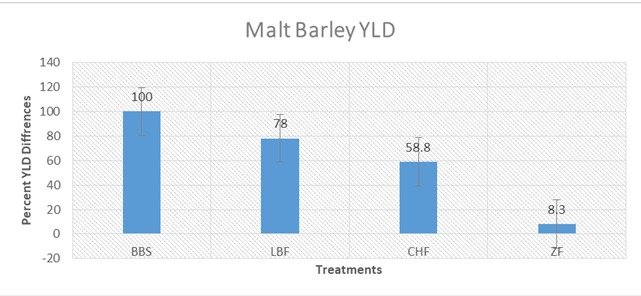Effects of Brewery Beer Bio-sludge and Liquid Biofertilizer on Performance of the Malt Barley Yield, Grain Quality and Soil Fertility at Arsi and West Arsi Zone, 2017 Ethiopia
Keywords:
Beer Bio-Sludge, Liquid Bio-Fertilizer, Inorganic Fertilize, Heavy Metals and Protein Content and Barley.Abstract
This study was conducted to investigate the effects of beer bio-sludge, liquid bio-fertilizer and inorganic fertilizer application to barley (Hordeum vulgare L.) var. traveler on the plant performance, grain quality and some soil properties. Treatments applied were: (1) Beer Bio-Sludge (BBS) (2) Liquid Bio-Fertilizer (LBF) (3) Chemical Fertilizer (CHF) (4) No Fertilizer (Control). The experiment was laid-out in simple plot design and randomized over locations. The plot sizes were 10m x 10m = 100m2. Phonologic, diseases, agronomic and yield, data were collected. Grain quality, sludge, liquid fertilizer and soil analysis were done. Sample sizes of ten plants/plot were used for agronomic data i.e., for plant height, panicle length, number of tiller and spikelet/panicle. Yield and yield related data; Thousand Kernel Weight (TKW), Straw Weight (STW) and Yield (YLD) were collected from 1m x 1m = 1m2 plot size. Significantly (p<0.05%) higher thousand kernel weight (51.63g), straw weight (1145 kg ha1) and grain yield (70.34 qt ha1) were obtained from soil applied with BBS and followed by LBF (50.25g, 1035kg ha1 and 65.08 qt ha1). Beer bio-sludge increased the yield of barley by (2.2, 4.12 and 9.17%) over that of LBF, CHF and Control, respectively. The linear correlation analysis indicated that, seed yield of malt barley had a positive and significant correlation with most of growth parameters and yield. The soil analysis result revealed that, soil in the two locations were in silt-clay textural classification and moderately acidic ranging from 5.53 to 5.53. Similarly, BBS improved soil chemical (acidity) and physical properties (textural classes) as compared to inorganic and non-fertilizer. The BBS treated soil showed higher value for some of major and secondary soil elements namely; available phosphors (17.11mg/kg (ppm)), potassium (553.22mg/kg (ppm)) calcium (2,499.01mg/kg (ppm)), magnesium (277.33 mm/kg(ppm), Sulfur (16.93mg/kg(ppm), high total nitrogen (0.32%), organic carbon (4.42%) and Cation Exchange Capacity (CEC) (32.01Meq/100g soil) as compared to others treatments. There was no effects of BBS treated soil on heavy metals concentration such as, Cu, Mo, Ni, Zn, Pb, Cd and Hg is comparably in accepted international standard ranges. H/ever, Nitrogen Percentage (14.80 and 12.00%), respectively in grain were little higher than the standard (<12%) in both BBS and untreated soil (control). In this study one can concluded that, the beer bio-sludge can improve both the physical & chemical properties of soil. Hence, BBS can serve as one of the best source of bio-fertilizers in the study areas and areas with similar agro-ecology zones.
Downloads

Published
How to Cite
Issue
Section
Copyright (c) 2022 Authors

This work is licensed under a Creative Commons Attribution-NonCommercial 4.0 International License.
